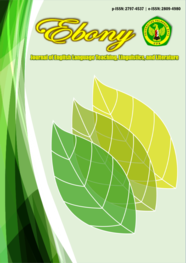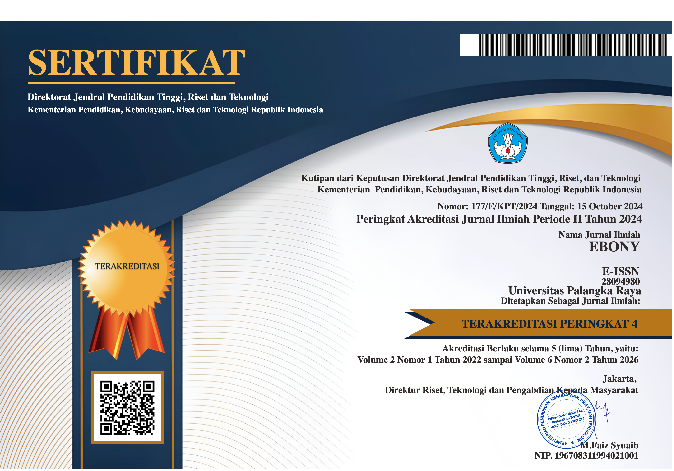Games in Enhancing Productive Skills for EFL Students
DOI:
https://doi.org/10.37304/ebony.v4i2.14032Keywords:
games in EFL teaching, speaking skill, writing skillAbstract
This article explores the use of games as an effective pedagogical strategy for improving EFL students' speaking and writing skills. Conducted through a literature review, the study examines various games used in language classrooms and their impact on language learning outcomes. The importance of language as a communication tool and the need to enhance students' English-speaking and writing skills are emphasized. Teachers' role in leveraging innovative game-based learning strategies is highlighted, focusing on games like Zepeto, board games, spinning wheel games, and guessing games. These games offer engaging, real-time language practice, promoting fluency, confidence, and motivation. The research method used by this study was literature reviews. Findings indicate the efficacy of these games in enhancing speaking and writing skills for the EFL students. The study underscores the value of game-based learning in making language education more enjoyable and effective. Concluding, the study advocates for the integration of game-based strategies in language classrooms to boost students' interest, engagement, and proficiency in English.
Downloads
References
Asher, J. J. (1966). The Learning Strategy of the Total Physical Response: A Review. The Modern Language Journal, 50(2), 79-84.
Brown, H. D. (2001). Teaching by Principles: An Interactive Approach to Language Pedagogy. Longman.
Cahyani, H. A., & Cahyono, B. Y. (2021). Collaborative Learning and Peer Feedback in Writing Classes Enhanced by Spinning Wheels. Journal of Language and Literature Education, 15(3), 225-243.
Çetin, H., & Cihan, Ş. (2021). The Effect of Story Wheel Method on Creative Writing Skills, Story Elements and Word Numbers. International Journal of Progressive Education, 17(5), 77–86. https://doi.org/10.29329/ijpe.2021.375.6
Darihastining, S., Sholihah, I. A., Surotin, F. N. A. P., & Hidayah, A. W. (2019). Online game as a media to improve students’ speaking skill. Journal homepage: http://journal2. um. ac. id/index. php/jisllac, 3(2).
Fauzi, I. (2022). Improving vocabulary through implementing song and game-based learning strategy of English for young learners. Yavana Bhasha: Journal of English Language Education, 5(1), 22-33.
Gee, J. P. (2003). What Video Games Have to Teach Us About Learning and Literacy. Palgrave Macmillan.
Graham, S., & Perin, D. (2007). Writing Next: Effective Strategies to Improve Writing of Adolescents in Middle and High Schools. Alliance for Excellent Education.
Hadley, A. O. (2003). Teaching Language in Context. Heinle & Heinle.
Harmer, J. (2004). How to Teach Writing. Pearson Education Limited.
Hidayati, A. N., Muin, A., & Rahmawati, E. (2023). The Effectiveness of Zepeto Game to Improve Students Speaking Skill. Wanastra : Jurnal Bahasa Dan Sastra, 15(1), 44–49. https://doi.org/10.31294/wanastra.v15i1.14476
Ho, P. V. P., Thien, N. M., An, N. T. M., & Vy, N. N. H. (2019). The Effects of Using Games on EFL Students’ Speaking Performances. International Journal of English Linguistics, 10(1), 183. https://doi.org/10.5539/ijel.v10n1p183
Hyland, K. (2003). Second Language Writing. Cambridge University Press.
Kartikasari, E. (2018). Improving Students’speaking Ability by Using Board Games Technique at Eighth Grade of MTsN 5 Ponorogo in Academic Year 2018/2019. Sarjana Thesis. Education and Teacher Training Faculty, State Institute of Islamic Studies Ponorogo (IAIN).
Kim, H., & Lee, S. (2020). Social Interaction within Online Games and its Impact on EFL Students' Speaking Skills. Language Learning Journal, 48(2), 188-207.
Lai, C., & Zheng, D. (2018). Task-Based Dialogue in Online Gaming Environments and Language Learning Outcomes. Journal of Educational Technology & Society, 21(3), 100-115.
Lightbrown, P. M., & Spada, N. (2013). How Languages Are Learned. Oxford University Press.
Madya, S., & Meiningsih, F. A. (2021). The Use of Guessing Game in Improving the Speaking Skills of Elementary School Students. IJEE (Indonesian Journal of English Education), 8(2), 327–339. https://doi.org/10.15408/ijee.v8i2.21679
Mubaslat, M. M. (2012). The Effect of Using Educational Games on the Students' Achievement in English Language. Journal of Educational & Psychological Research & Reviews, 22(4), 123-135.
Nation, I. S. P. (2001). Learning Vocabulary in Another Language. Cambridge University Press.
Nunan, D. (1999). Second Language Teaching & Learning. Heinle & Heinle.
Nunan, D. (2004). Task-Based Language Teaching. Cambridge University Press.
Özkan, Ö. (2016). İlkokul dördüncü sınıf öğrencilerinin öykü yazma becerilerinin geliştirilmesi. Master's Thesis, Adnan Menderes Üniversitesi, Sosyal Bilimler Enstitüsü.
Peterson, M. (2016). The Use of Flow States in Applied Linguistics and Online Gaming Contexts. Computer Assisted Language Learning, 29(5), 894-909.
Purnamasari, D., Hidayat, D. N., & Kurniawati, L. (2021). An analysis of students’ writing skill on English descriptive text. English Education: Jurnal Tadris Bahasa Inggris, 14(1), 101-114.
Rabbani, N., Vianty, M., & Zuraida, Z. (2016, September). Using Games to Enhance Speaking Performance of The Seventh Grade Students of SMP Negeri 43 Palembang. In Sriwijaya University Learning and Education International Conference (Vol. 2, No. 1, pp. 807-820).
Rachmaida, F. (2022). The Use of Spinning Wheel Games to Improve Students’ Writing Procedural Texts. JOLLT Journal of Languages and Language Teaching, 10(4), 530. https://doi.org/10.33394/jollt.v%vi%i.5766
Rao, P. S. (2019). The importance of speaking skills in English classrooms. Alford Council of International English & Literature Journal (ACIELJ), 2(2), 6-18.
Richards, J. C., & Rodgers, T. S. (2001). Approaches and Methods in Language Teaching. Cambridge University Press.
Snyder, H. (2019). Literature review as a research methodology: An overview and guidelines. Journal of Business Research, 104, 333–339. https://doi.org/10.1016/j.jbusres.2019.07.039
Spratt, M., Pulverness, A., & Williams, M. (2005). The TKT Course: Modules 1, 2 and 3. Cambridge University Press.
Tiing, C. W. H., & Yunus, M. M. (2021). Board games in improving pupils’ speaking skills: A systematic review. Sustainability (Switzerland), 13(16). https://doi.org/10.3390/su13168772
Vernon, S. (2009). Cooperative Learning through Board Games in EFL Classrooms. English Teaching Professional, 60, 16-20.
Wright, A., Betteridge, D., & Buckby, M. (2005). Games for Language Learning. Cambridge University Press.
Downloads
Published
How to Cite
Issue
Section
License
Copyright (c) 2024 Siti Munawarah, Sifa Hayati, Windi Fitriyani, Erwan Rahman, Mieyrandha, Laura Melinda Maharani, Jonathan Tegar, Iwan Fauzi

This work is licensed under a Creative Commons Attribution 4.0 International License.











